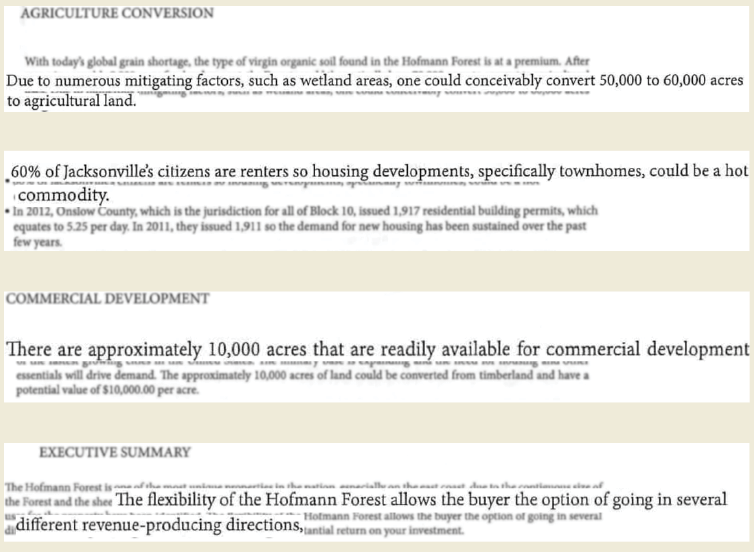
The prospective buyer of N.C. State’s Hofmann Forest plans to convert most of the land into residential and commercial properties and farmland, which contradict previous statements made by the company and University officials.
According to Hofmann Forest LLC documents, which were leaked Wednesday, the company intends to develop 9,000 acres of the 79,000-acre forest for homes and office buildings and could “conceivably devote 50,000 to 60,000 acres for farmland.”
The prospectus conflicts with statements made by a Hofmann Forest LLC spokesperson who said the company intends to leave the land “as it is.” These documents also contradict statements made by Chancellor Randy Woodson and the College of Natural Resources Dean, Mary Watzin, who justified the deal by saying the Hofmann Forest would be preserved.
The documents also address the possibility of building military installations, such as airfields and using the land for mining and dirt harvesting.
According to Brad Bohlander, associate vice chancellor for University Communications and chief communications officer at N.C. State, university administrators were not aware of Hofmann Forest LLC’s intention to develop the forest.
“This is the first N.C. State has seen or heard of this document and it includes information that is not contained in the sales agreement,” according to a statement released Wednesday. “We are contacting the buyer to determine when the document was prepared, its accuracy and whether it reflects the buyer’s current views regarding potential use of the land.”
Bohlander said the University doesn’t want to speculate about its next course of action until the documents are verified.
N.C. State officials weren’t able to contact Hofmann Forest LLC as of Thursday evening.
“The idea that Chancellor Woodson and Dean Watzin are unaware of this prospectus is ludicrous. I think this needs to bring things down on N.C. State,” said Ron Sutherland, a conservationist for the Wildlands Network. “For them to be hiding this, lying to students and faculty and the media when there is $150 million on the line, is appalling.”
Tom Percival, a spokesperson for the company said the documents were created to show the potential uses of the forest, and that they no longer intend to develop the land for real estate or agriculture, according to The News & Observer.
“The purpose of this document was to show [Jerry Walker, managing member of Hofmann Forest LLC] and other members the many different and synergistic aspects that Hofmann Forest possesses and its potential for various types of uses that have been identified over the years,” Percival said. “As an example, the development plans in the document are renderings that were done many years ago by North Carolina State University as a general study and were not prepared by or for Hofmann Forest, LLC. Since this document was created, the LLC, under the guidance of Jerry Walker, has recognized the value of the Hofmann as a forest and has no plans to develop the property into a large commercial and residential community.”
The prospectus was released the day after a Wake County judge declined to stop the sale of the Hofmann Forest in response to a lawsuit filed in September by Fred Cubbage, a professor of forestry and natural resources and forest economics at N.C. State, and other plaintiffs.
As of Tuesday, Special Superior Court Judge Shannon R. Joseph was considering dismissing the lawsuit because the plaintiffs couldn’t prove that the forest would be irreparably damaged if the sale went through.
According to Cubbage, the plaintiffs tried to convince Joseph that the Hofmann Forest sits on public land and therefore should be subject to a State Environmental Policy Act analysis in order to evaluate the potential environmental impacts of the proposed project. The plaintiffs said the Hofmann Forest is public land because the University doesn’t pay property taxes. More importantly, Cubbage said Rufus Edmisten, the North Carolina attorney general from 1974-84, released a statement in 1980 saying the Hofmann is a public and owned by the state.
In an interview with Technician earlier this month, Watzin said the Hofmann is owned by the N.C. State endowment fund, an independent organization exempt from property taxes.
“[The endowment fund and the board of trustees] have paid no property taxes for 79 years on the premise that the Hofmann is public,” Cubbage said. “They tell the counties ‘we’re public’ so they don’t pay taxes and tell us, the stakeholders, that they’re private so they don’t have to do a SEPA analysis.”
The plaintiffs have argued that if the Hofmann Forest sale is finalized, the land would experience massive erosion and runoff.
According to Cubbage, if the entire forest were converted to farmland, runoff would increase almost 2,000 times. If the forest were developed commercially or residentially, runoff would increase more than 5,300 times, bringing fertilizers and chemicals into the area’s water supply.
Cubbage said he’s skeptical about the Hofmann Forest’s future because the contract between N.C. State and Hofmann Forest LLC. doesn’t guarantee the forest will be preserved.
“There’s nothing that would bind [Hofmann Forest LLC.] to their agreement of maintaining the forest other than their integrity or good will they’ve generated so far in this process,” Cubbage said. “It would obviously be an environmental disaster of unmitigated proportion if the sale goes through.”